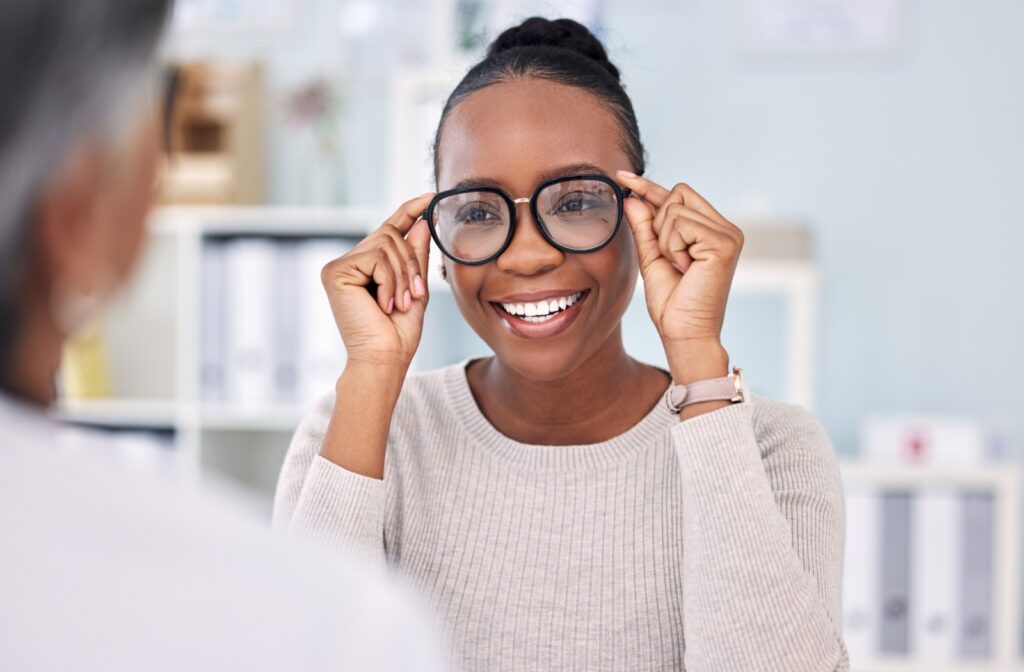When you or your child gets a new pair of glasses from Valley Eye & Vision Clinic, there’s often a moment of amazement: things far away suddenly snap into focus, street signs are legible again, and reading becomes more comfortable. But it doesn’t take long before people wonder, “Will wearing these all the time make my eyes worse?”
It’s a question we hear often, especially from concerned parents of kids who have just had eye exams and are new to wearing glasses. But while it might feel like your vision gets worse once you start wearing them, that’s not actually what’s happening.
Glasses do not weaken your eyesight. They simply correct how light enters your eyes, so that you can see more clearly.
How Glasses Work
Vision problems like nearsightedness (myopia), farsightedness (hyperopia), astigmatism, and age-related presbyopia are all refractive errors—a kind of vision condition where light doesn’t land correctly on the back of the eye.
Prescription lenses address refraction errors by adjusting how light enters the eye. This correction happens outside of your eyes and doesn’t directly affect them in any way. Glasses are simply tools that enhance your vision while you wear them. They don’t make your eyes dependent or weaker.
Why It Might Feel Like Glasses Make Things Worse
It’s not unusual to feel like your eyes have gotten worse after wearing glasses for a while. But here’s what might actually be going on:
1. You’ve Gotten Used to Clearer Vision
Once you’ve seen the world in focus, your brain gets used to that clarity. When you take your glasses off, the resulting contrast in vision quality can make your uncorrected vision seem blurrier than it was before—even though nothing changed.
2. Your Vision Is Naturally Changing
Eyesight changes over time, especially in kids and older adults. Kids’ eyes grow, and their prescriptions may change frequently. Adults may experience age-related vision shifts, like presbyopia. These changes would likely happen whether or not you wear glasses.
3. Digital Eye Strain Is On the Rise
Spending a lot of time looking at screens can strain your eyes and make them feel tired, dry, or blurry. This doesn’t mean your glasses are making your eyes worse—it means your eyes need a break. Simple habits like following the 20-20-20 rule can help ease this strain.
4. You Might Need a New Prescription
If your glasses aren’t helping like they used to, it could be time for an updated prescription. Eyes change, and wearing the wrong prescription can cause discomfort or headaches. Regular eye exams help keep your prescription up to date.
The Role of Regular Eye Exams
One thing you can do to improve your vision is to keep up with regular comprehensive eye exams. These visits do more than just update your prescription; they also help detect early signs of eye diseases like glaucoma, cataracts, or macular degeneration.
During an eye exam, your optometrist can:
- Measure your current prescription
- Check how your eyes work together
- Screen for eye conditions
- Provide guidance for screen use, nutrition, or lifestyle habits
For kids, eye exams are especially important. Vision problems can impact school, sports, and self-confidence. If your child seems to be squinting or complaining of headaches, it’s worth scheduling a visit to check their eyesight.
Tips to Support Long-Term Vision Health

While glasses won’t weaken your vision, there are some daily habits that can help you (and your family) protect your eyes and stay comfortable:
Practice the 20-20-20 Rule
Every 20 minutes, take a 20-second break and look at something 20 feet away. This helps relax your focusing muscles and prevent digital eye strain.
Block Out UV Rays
Wear sunglasses that block 100% of UVA and UVB rays when you’re outside. UV exposure can increase the risk of cataracts and other eye conditions over time.
Stay Hydrated
Dry eyes can feel gritty, itchy, or blurry. Drink plenty of water and consider using lubricating eye drops if needed, especially in dry or windy weather.
Eat Eye-Friendly Foods
Foods rich in vitamins A, C, and E, and/or omega-3 fatty acids all support long-term eye health. Leafy greens, carrots, citrus fruits, and fish like salmon are great options.
Take Screen Breaks
Kids and adults alike can benefit from time away from screens. Encourage outdoor play for children, and take regular breaks throughout the workday.
Focus on What Matters: Seeing Clearly
Wearing glasses doesn’t cause your eyesight to get worse. Glasses just help you see better right now. If your vision changes down the line, this is likely due to natural development, aging, or screen-related fatigue, not your lenses.
To protect your eyesight, take a proactive approach: schedule regular eye exams with our team at Valley Eye & Vision Clinic, practice healthy screen habits, and support your eyes with good nutrition and protection.
We’re here to answer your questions, help you find the right prescription, and support your whole family’s vision needs. Whether you’re getting your first pair of glasses or scheduling your next routine check-up, we’re here to help you see clearly and comfortably every step of the way.


